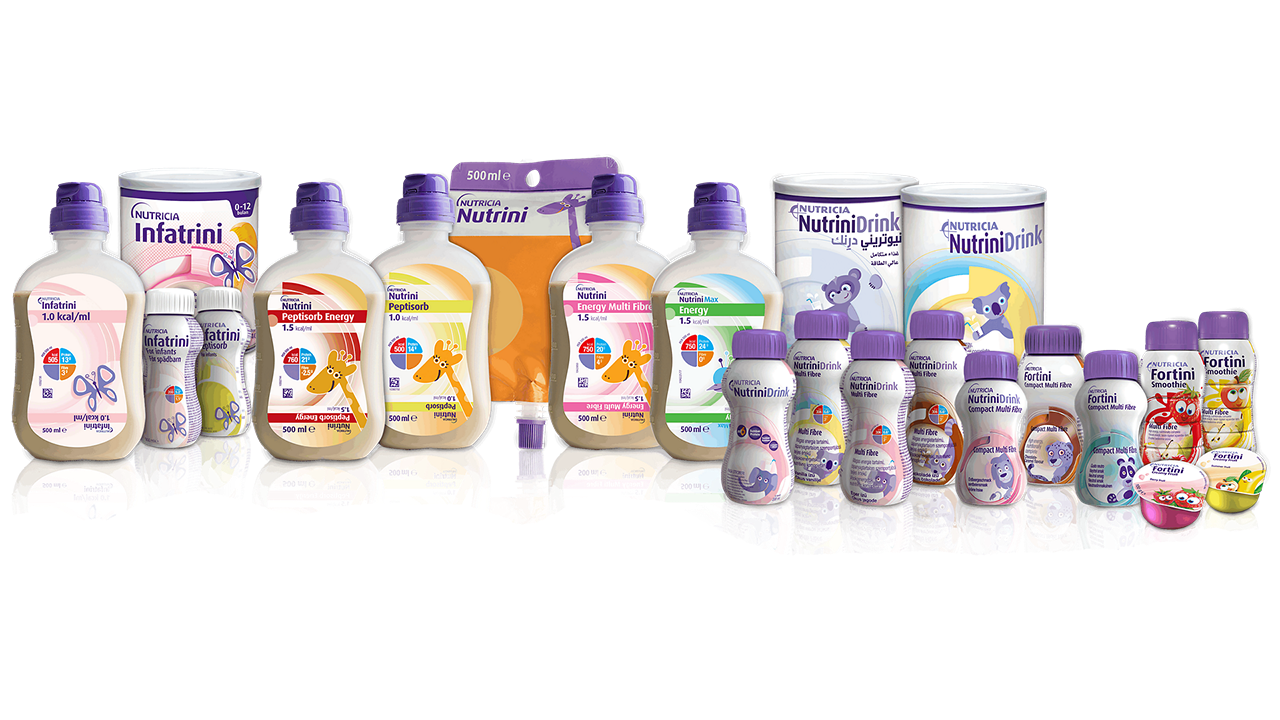Optimal growth and development in childhood are essential for long-term health and well-being. However, there are a number of reasons why some children can have difficulties growing optimally. Inadequate growth may occur in children who have an underlying disease or condition such as cerebral palsy, a congenital heart disease, cystic fibrosis, liver disease or cancer1-2. This is often due to a poor intake during their illness or nutritional requirement being higher. In addition, it can occur when there is no disease-related cause, for example, with feeding difficulties3.
Cath and Frankie’s story
“Frankie has a heart condition that he was born with. He was tube fed straight away. We have to get extra calories added into his milk as Frankie is very slow at putting on weight – and keeping the weight on because he’s very active, very active! It is a bit of a battle.
His feeds have been his main source of food and fluid, for him to grow up, and he’s done fantastic with them. We treat him like every other child, he can run, jump, play. We don’t let anything stop him.”
“It’s incredible. From such a difficult start in life, Frankie can now run, he can jump – we don’t let anything stop him.”
Cath, Frankie’s mum - UK
What can cause growth challenges in early life?
Normal growth for children starts with meeting their nutritional needs [4,5].
Related articles
The role of nutrition in managing children facing growth challenges due to their medical condition
Whatever the cause of inadequate growth, making sure the infant or child gets enough of the right nutrition is very important. Problems such as gastrointestinal issues, poor recovery from illness, increased risk of infections and longer hospital stays have been linked with poor nutritional intake5,6. Nutritional screening and growth monitoring are therefore important to ensure children are identified early and receive the right nutritional support to help them grow and develop5,6.

Feeding difficulties in children with cerebral palsy: why they matter and how to recognize them
Children with cerebral palsy often have difficulties with feeding and swallowing. These can cause children to become underweight and undernourished, with consequences for growth and development7,8. The Feeding and Nutrition Screening Tool9 can help parents screen for risk of feeding/swallowing difficulties and undernutrition quickly and easily, so they know when to seek medical help.

A practical guide for parents to monitor a child’s growth at home
The Coronavirus pandemic means that many of us are no longer seeing healthcare professionals face to face. For parents or carers who are concerned about their child’s growth, this means measuring their child's growth at home. For parents who are unsure of the best way to do this, this practical guide explains step-by-step how to perform growth measurements and provides advice about the simple equipment needed to get started.
Nutricia’s role in managing infants & children facing growth challenges due to their medical condition
The Nutricia range of foods for special medical purposes span from infancy to adolescence and beyond. We partner with healthcare professionals and other experts to help manage children with a wide range of medical conditions, to ensure they grow and develop as well as possible. Our aim is to improve long-term health outcomes by offering a range and variety of medical nutrition products, including oral or tube feeding options, as well as tubes/pumps.
News
Feeding and Nutrition Screening Tool (FNST) for children with cerebral palsy
For Healthcare professionals only

Pediatric DRM healthcare professionals pages
The Healthcare professionals pages provide access to a range of articles and resources related to Pediatric Disease-Related Malnutrition, including clinical guidelines and detailed product information. The pages are for healthcare professionals only.
- Mehta et al. JPEN 2013: 37(4):460-481
- Beer et al. Nutr Clin Practice 2015;30:609-624
- Kerzner et al. PEDIATRICS 2015;135(2)
- Beer et al. Nutr Clin Practice 2015;30:609-624.
- Hecht et at. Clin Nutr 2013:34:53-59.
- Huysentruyt et al. Nutrition 2013;29 1356-1361.
- Fung EB, Samson Fang L, Stallings VA, et al. J Am Diet Assoc 2002; 102: 361–73.
- Samson-Fang L, Fung E, Stallings VA, et al. J Pediatr 2002; 141: 637–43.
- Bell KL, Benfer KA, Ware RS, et al. Dev Med Child Neurol. 2019;61(10):1175-81.
Are you a healthcare professional or (carer of) a diagnosed patient?
The product information for this area of specialization is intended for healthcare professionals or (carers of) diagnosed patients only, as these products are for use under healthcare professional supervision.
Please click ‘Yes’ if you are a healthcare professional or (carer of) a diagnosed patient, or ‘No’ to be taken to a full list of our products.
The information on this page is intended for healthcare professionals only.
If you aren't a healthcare professional, you can visit the page with general information, by clicking 'I'm not a healthcare professional' below.



